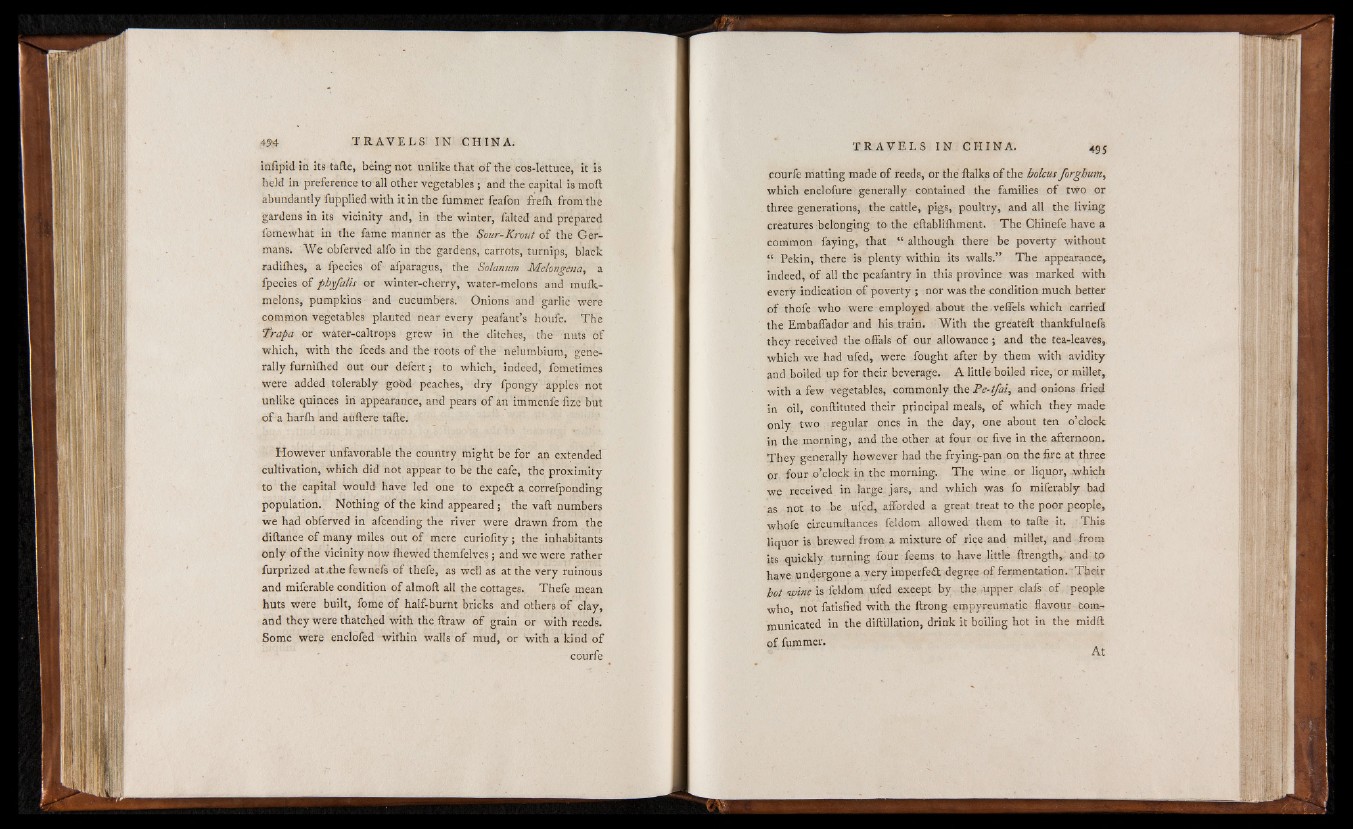
infipid in its tafte, being not unlike that o f the cos-lettuce, it is
held in preference to all other vegetables ; and the capital is mod
abundantly fupplied with it in the fummer feafon freih from the
gardens in its vicinity and, in the winter, faked and prepared
fomewhat in the fame manner as the Sonr-Krmt o f the Germans.
We obferved alfo in the gardens, carrots, turnips, black
radilhes, a fpecies o f afparagus, the Solatium Mclongena, a
fpecies o f phyfalis or winter-cherry, water-melons and muik-
melons, pumpkins - and cucumbers. Onions and garlic were
common vegetables planted near every peafant’s houfe. The
Trapa or water-caltrops grew in the ditches, the nuts o f
which, with the feeds and the roots o f the nelumbium, generally
furnilhed out our defert; to which, indeed, fometimes
were added tolerably gobd peaches, dry fpongy' apples not
unlike quinces in appearance, and pears o f an immenfe fize but
o f a harih and auftere tafte.
However unfavorable the country might be for an extended
cultivation, which did not appear to be the cafe, the proximity
to the capital would have led one to expeit a correfponding
population. Nothing o f the kind appeared; the vaft numbers
we had obferved in afcending the river were drawn from the
diftance o f many miles out o f mere curiofity; the inhabitants
only o f the vicinity now ftiewed themfelves ; and we were rather
furprized at .the fewnefs o f thefe, as well as at the very ruinous
and miferable condition o f almoft all the cottages.. Thefe mean
huts were built, fome o f half-burnt bricks and others o f clay,
and they were thatched with the ftraw o f grain or with reeds.
Some were enclófed within walls o f mud, or with a kind o f
courfe
courfe matting made o f reeds, or the ftalks o f the holcus forghum,
which enclofure generally contained the families o f two or
three generations, the cattle, pigs, poultry, and all the living
creatures belonging to the eftabliihment. The Chinefe have a
common faying, that “ although there be poverty without
“ Pekin, there is plenty within its walls.” The appearance,
indeed, o f all the peafantry in this province was marked with
every indication o f poverty ; nor was the condition much better
o f thofe who were employed about the.veflels which carried
the Embaflador and his train. With the greateft thankfulnefs
they received the offals o f our allowance ; and the tea-leaves,
which we had ufed, were fought after by them with avidity
and boiled up for their beverage. A little boiled rice, or millet,
with a few vegetables, commonly the Pe-tfai, and onions fried
in oil, conftituted their principal meals, o f which they made
only two regular ones in the day, one about ten o’clock
in the morning, and the other at four or five in the afternoon.
T hey generally however had the frying-pan on the fire at three
or four o’clock in the morning. The wine or liqupr, .which
we received in large, jars, and which was fo miferahly bad
as not to be ufed, afforded a great treat to the poor people,
whofe ciroumftances feldom allowed them to tafte it. This
liquor is brewed from a mixture o f rice and millet, and from
its quickly turning four feems to have little ftrength, and to
have undergone a very imperfedt degree o f fermentation. Their
hot ivint is feldom ufed except by the .upper clafs o f people
who not fatisfied with the ftrong empyreumatie flavour communicated
in the diftillation, drink it boiling hot in the midft
o f fummer.
At